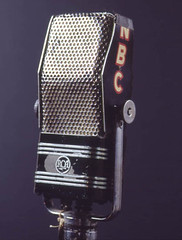
In truth, all language is political. This is because when writing or conversing, there is more going on than the communication of whatever base information the words stand for. There are numerous different ways in which the same basic thing can be said. The words that the writer/speaker uses are specifically chosen, in part, because the writer/speaker is trying to communicate something about themselves. Their rhetoric reveals not only what group said person identifies or is attempting to identify with, but can also reveal how said person feels about whatever group may be their subject and/or whatever group they are addressing.
Example: I work with teens. Say I am at a youth camp and approach a group of boys who obviously like emo music very much to introduce myself.
If I say, "Hey guys, sweet hair. I like the way you shoot it to the right when it gets in your eyes too much (cocky smile). That was a Death Cab song you were playing there on your acoustic guitar right? (Wait for them to nod in silence) Sweet. Nice stickers on that guitar too, how they're all crooked and unbalanced. Especially that one. I'm glad you're doing your part to combat the Nazi message... I'm Wil, what are your names?" I reveal myself to be someone who fears becoming out of touch with age, nevertheless has become slightly out of touch and tries to combat this by keeping up with popular music trends and watching Napoleon Dynamite to learn the current acceptable way to say "cool," but who realizes this and hates it for it's shallowness and therefore tries to make himself feel like he's above it by slipping in some sarcasm. I also care, at least on a shallow level, for these teens, am open to their culture, and want to be accepted by them.
On the other hand, if I walk up to them and say, "Hey, I knew you punks were gonna be trouble. Lunch started fifteen minutes ago, why are you loiterin' around here? ...Who am I? You can call me Sir. Come on. Now! Don't just look at me like I got tinkle on my pants. And afterwards I got some clippers back in my cabin, I'll have the little lady cut that hair. Between that and those tight jeans you look like a sad, pretty little girl. Come on! Move! Maybe if your pants weren't so tight you could keep up. Shameful, showing all you got through your denim like that. Used to be the girls I had to get onto for not coverin' up what God gave 'em. Now it's you little boys too!" I reveal my ignorance of and/or dislike for teen culture and that I care little for these particular teens and whether or not I am accepted by them. In fact, I probably harbor something personal against all cool kids their age and will soon be the subject of creepy little government post cards that my new neighbors will receive whenever I move.
The examples are infinite, but the point was grasped long ago. The words chosen communicate much about the communicator and their position toward their subject and audience.
Admittedly, in a situation like this, the above judgments may not be accurate. Maybe the second guy does care. Maybe a lot. Maybe he does have a gruff but still innocent concern for decency. Maybe he's just having a bad day. Maybe he did just trickle in his drawers a little and at this moment he's self-conscious and embarrassed and his words came carelessly out of emotion. But when politically correct language is used, especially in writing and public discourse, it is not careless but intentional and calculated. Some of it (not all, but some) is so ridiculous that it would be virtually impossible for anyone to use it on accident (poor = economically disadvantaged?). The question begging to be asked is why the person using the PC language is doing so? The answer, more than employing it for the benefit of poor people and folks in wheelchairs, is to communicate something about themselves. And what they are telling us usually isn't true.
What they want to convey is that they are nice and care about these people. That they really are trying to make things better for them. Sounds sweet. But it's not. In reality politically correct language is almost always patronizing, lazy and selfish. It allows the person using it to feel like they have been a part of a real solution without requiring them to actually do anything. And those who supposedly benefit from the new moniker see right through this in a way that only the often-patronized can.
As David Foster Wallace (good writer, check him out) says in his essay Authority and American Usage:
I strongly doubt whether a guy who has four small kids and makes $12,000 a year feels more empowered or less ill-used by a society that carefully refers to him as 'economically disadvantaged' rather than 'poor.' If I were he, in fact, I'd probably find the Politically Correct English term insulting...(because)...like many forms of vogue usage Politically Correct English functions primarily to signal and congratulate certain virtues in the speaker - scrupulous egalitarianism, concern for the dignity of all people, sophistication about the political implications of language - and so serves the self-regarding interests of the PC far more than it serves any of the persons or groups named.
The language might be nice, but nice is shallow. Nice is not necessarily concerned for what is actually good. In fact, when it is used to pacify those suffering and simultaneously cloak inaction, nice is downright evil.
What does all this mean then for me, as a Christian? Well, I use politically correct language (as you can tell by the absence of gender specific pronouns in the above unless I am referring to a specifically named person). In some ways it is important. The way in which we talk about things influences the way we think about them,* but it is not enough to just change the way we think about those who suffer. We need to change the way we act towards them. Let's quit patronizing them with nice titles so we can feel good about ourselves and actually do something for them. The love of God cannot be separated from the love of our brothers and sisters. And I am guilty of this.
So what am I going to do? Or am I just preaching? Doing exactly what I am condemning and thinking that simply writing this is enough? I hope not. And if I do not let you know in a later blog how I am, in some way or another, trying to actually do something, you have the right and responsibility to reply to this blog and call me a self-righteous, patronizing hypocrite.
*Which is exactly why I refuse to replace "poor" with "economically disadvantaged." Poor should be a terrible word, but not to insult the poor. It should stir something in their brothers and sisters that moves them to loving action. "Economically disadvantaged" makes poverty sound too much like a permanent spinal chord injury or something. Something unfortunate, but something that the average person can do nothing about. So instead of helping we "commiserate" from a distance and leave the work of aiding our so called "commiserator" to some specialist.

No comments:
Post a Comment